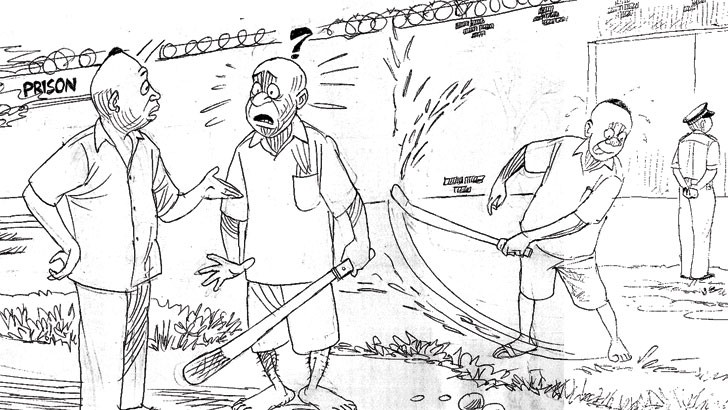The dancing monkeys
A prince had some monkeys trained to dance. Being naturally great mimics of humans’ actions, they showed themselves most apt pupils and when arrayed in their rich clothes and masks, they danced as well as any of the courtiers.
The spectacle was often repeated with great applause, till on one occasion a courtier, bent on mischief, took from his pocket a handful of groundnuts and threw them upon the stage.
The monkeys at the sight of the groundnuts forgot their dancing and became (as indeed they were) monkeys instead of actors.
Pulling off their masks and tearing their robes, they fought with one another for the groundnuts.
The dancing spectacle, thus, came to an end amid the laughter and ridicule of the audience.
“Monkeys will remain monkeys.”
While Malawi’s neighbours, Zambia, Tanzania and Mozambique—a country once embroiled in a 16-year-old civil war—have made tremendous economic advancement, economically and socially, Malawi is standing exactly where it was 52 years ago, and there are telling signs the country will stagnate economically in probably another 50 years from now.
There are so many reasons for the economic backwardness of Malawi that can be classified into structural, altitudinal and political.
Thirteenth century philosopher Thomas Aquinas, just like Aristotle, argues that the aim of practical reason is the final end and the final end of human life is happiness or beatitude.
Unfortunately, for example, politically, Malawi’s mediocre, selfish, corrupt, myopic, predatory and fire-fighting political class is dearth of practical reason in Aquinas’ sense such that being a rich politician because a person next door is poor and deriving some satisfaction is now a norm.
In the words of Sam Mpasu, Malawi has had leaders without “the altitude and vision of the eagle, to see far”, but “the altitude and vision of the crow, to see no further than the next rubbish dump, for scavenging.”
No wonder President Peter Mutharika and Democratic Progressive Party (DPP), like the dancing monkeys, they have fast forgotten their pretence to govern and become who they were under Bingu wa Mutharika and, of course, who they in truth are—opportunistic, nepotistic, insensitive, indecisive, extravagant and skillfully arrogant.
So at a time the country is failing to provide adequate health, education, security, water, electricity and other public services and people in the villagers are eating wild roots to survive, a recent government special directory records over 16 special assistants to President Mutharika.
One wonders is the Professor such intellectually malnourished that he needs 16 good people at State House and redundantly relevant ministries, departments and agencies to smoothly and effectively run the government?
According to Weekend Nation calculations, each adviser gets an average monthly package of roughly K1.6 million, which translates to K25.6 million a month for the 16, totalling K307 million annually.
Some history has it that Emperor Haile Selassie of Ethiopia lost his throne because of such insensitiveness to people’s suffering.
At the time majority Ethiopians in the north of the country were dying from famine, he appeared on television cutting his 83rd birthday cake which had been baked in and was especially flown from Switzerland.
But Mutharika only has to rise above politics of patronage as well as nepotistic tendencies responsible for the over-hiring of ‘experts’ in praise-singing and not in technical capability that has contributed to the country’s political and economic mess as well as channelling of money from the public purse to few individuals with no relevance to the common good.
The President has to be bold enough and do something unimaginable by dismantling the system of patronage by especially getting rid of his personal cronies in the advisory circle for effective governance. n



